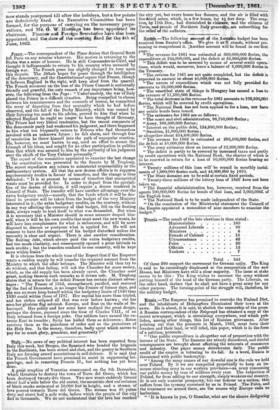'ream—The correspondent of the Times denies that General Scott left
Paris on any mission'whatever. His motive in returning to the Stales tau a genie of honour. He is still Commander-in-Chief, and thought it indispensable to return 'to his country when menaced by foreign war. 'The French press has slightly changed its tone upon this dispute. The Debate hopes for peace through the intelligence of the democracy, and the Conalilutionnel argues that France, though it believes England in the right, will keep aloof from the quarrel. The French comment on the loss of the Prince Consort is universally friendly and graceful, the only remark of any importance being, how- ever, the following from the Pays : "Unfortunately, the war of Italy I placed the Prince in a difficult situation. Being compelled to choose between his reminiscences and the counsels of reason, he committed the error of departing from that neutrality which he had before observed, and the fall of the Derby Ministry, which was caused by their listening too much to his advice, proved to him that when he adopted England he ought no longer to have thought of Germany. The Prince had very liberal tendencies, but the recent conquests of the democratic party had weakened his judgment, and there happened to him what too frequently occurs to Princes who find themselves involved with an unknown future : be felt alarm, and through fear of revolution he threw himself into the path of unpopular reaction. Be, however, we must hasten to say, used no effort to secure the triumph of his ideas, and sought for no other participation in politics than that which was assured to him by the authority of his judgment over the chiefs of the Tory Cabinet personally." The report of the committee appointed to examine the last change in the constitution was presented to the Senate by M. Troplong. The report repudiates any return to ministerial responsibility or the parliamentary system. All that the new decree effects is to suppress supplementary credits in favour of transfers, and the change s thus defended : "It is at present by means of transfers that unexpected wants must be provided for. In order to depart from the speciali- ties of the decree of division, it will require a decree rendered in Council of State. The transfer will have another advantage over the extra budgetary credit—namely, that the funds which it will be des- tined to procure will be taken from the budget of the very Ministry interested in it; the extra budgetary credits, on the contrary, without in any way affecting the economy of that budget, fell on the floating debt, always ready to lend itself to what was demanded. But when it is necessary that a Minister should in some measure despoil him- self, when it will be his own credits that must meet the new wants, he will have less complaisance for what is unforeseen, and will be more disposed to discuss or postpone what is applied for. He will not consent to have the arrangement of his budget disturbed unless the necessity is clear and urgent. There is also another consideration. The floating debt, which always paid the extra budgetary credits, had too much elasticity, and consequently opened a great latitude to such credits ; but the transfers confined to one ministry, will be kept snore within limits."
It is obvious from the whole tone of the Report that if the Emperor wants a sudden supply he will transfer the required amount from the Ministry to which the affair belongs. The Minister will then try to do without, and that failing, will ask the Chamber for more money, which, as the old supply has been already spent, the Chamber must grant, making thereon such remarks as it deems safe. M. Troplong states that in return for the deficit France has certain distinct advan- tages : "The France of 1852, strengthened, pacified, and restored by the 2nd of December, is no longer the France of former days, and she can no more keep herself within the budgetary limits of 1840 than 1830 could within those of 1787. Her capital has more than tripled, and her riches eclipsed all that was ever before known; she has seen her glorious flag astonish Europe, and float on the walls of Se- bastopol. Her policy and her arms have realized the great design, perhaps the dream, pursued since the time of Charles VIII., of an Italy released from a foreign yoke. Our soldiers have caused the ex- treme East to tremble ; Syria has hailed them as deliverers ; Rome receives them as the guardians of order and as the protectors of the Holy See. Is the money, therefore, badly spent which serves to pay for so much glory, grandeur, and generosity I"






























 Previous page
Previous page